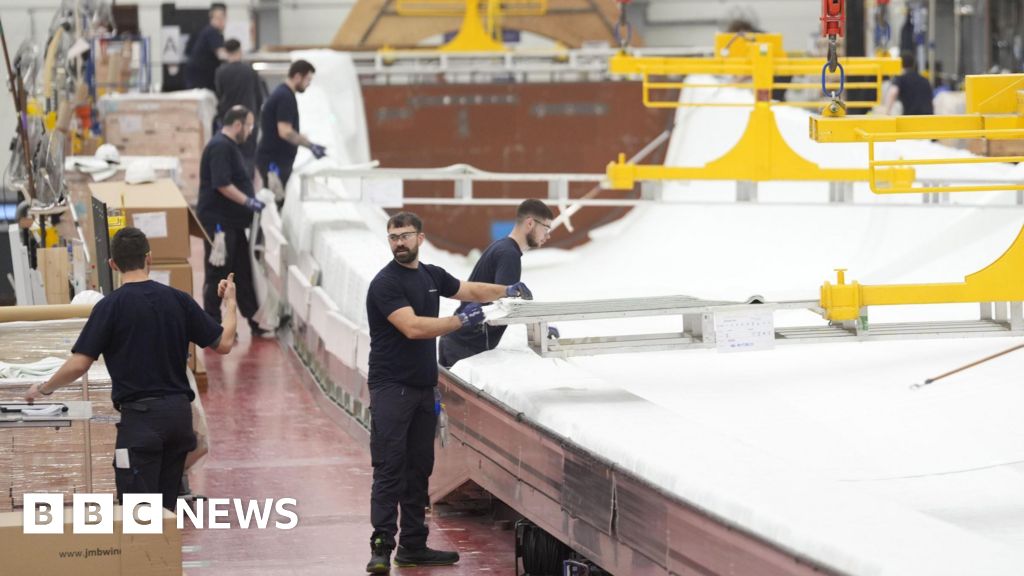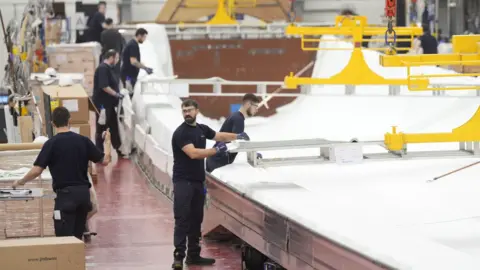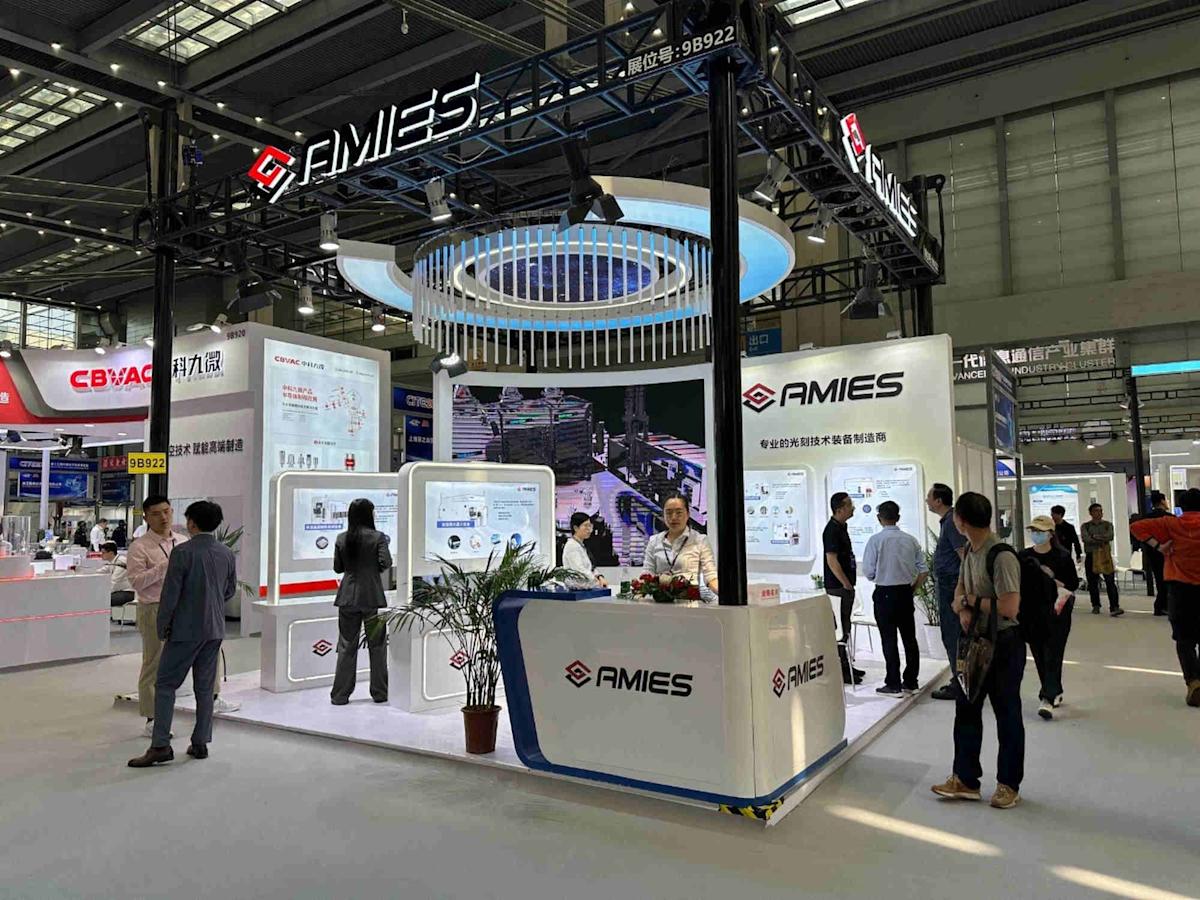With age comes a natural decline in cognitive function, even among otherwise healthy adults without dementia. A new study finds that a cognitive training program may boost production of a brain chemical that plays a role in memory and attention.

With age comes a natural decline in cognitive function, even among otherwise healthy adults without dementia. A new study finds that a cognitive training program may boost production of a brain chemical that plays a role in memory and attention.

Pokémon has always been a jet-setting series, with its head in the clouds and its feet planted firmly in the real world. The first four generations of Pokémon games took us on a whirlwind tour of Japan. Red and Blue were…

Pritti MistryBusiness reporter
 PA Media
PA MediaThe government has announced plans to train and recruit more workers for the UK’s clean energy sector, promising to create 400,000 extra jobs by 2030.
Plumbers, electricians and welders are among 31 priority occupations that are “particularly in demand”, with employment in renewable, wind, solar and nuclear expected to double to 860,000 in five years, ministers have said.
Speaking on the BBC’s Sunday with Laura Kuenssberg programme, Energy Secretary Ed Miliband said thousands of jobs were needed to develop Britain’s clean energy sector to “get bills down for good”.
Welcoming the proposals, Unite the union said: “Well-paid, secure work must be at the heart of any green transition.”
As part of the government’s strategy, five “technical excellence colleges” will be set up to train workers with clean energy skills, with £2.5m in funding going towards pilot schemes in Cheshire, Lincolnshire, and Pembrokeshire, according to the Department for Energy Security and Net Zero (DESNZ).
A new programme is to be launched to match veterans with careers in solar panel installation, wind turbine factories and nuclear power stations, while oil and gas workers could benefit from up to £20m from the UK and Scottish governments for bespoke careers training in clean energy roles.
There would be also be tailored schemes for ex-offenders, school leavers and the unemployed.
He said 10,000 extra jobs would be needed to support the construction of the Sizewell C nuclear power station in Suffolk and described how the Siemen’s wind turbine factory in Hull was “booming”.
Miliband also told the BBC he stood by his pledge to reduce energy bills by £300 by 2030, after bills went up by 2% for millions across the UK under Ofgem’s latest price cap.
In a statement, Miliband said the plan would bring “a new generation of good industrial jobs” to communities across the UK.
“Our plans will help create an economy in which there is no need to leave your hometown just to find a decent job.
“Thanks to this government’s commitment to clean energy, a generation of young people in our industrial heartlands can have well-paid, secure jobs, from plumbers to electricians and welders.”
According to DESNZ, jobs in the clean energy sector command average salaries of more than £50,000, compared to the UK average of £37,000.
Work and Pensions Secretary Pat McFadden said: “We’re giving workers the skills needed to switch to clean energy, which is good for them, good for industry, and will drive growth across the nation.
“Our new jobs plan will unlock real opportunities and ensure everyone has access to the training and support to secure the well-paid jobs that will power our country’s future.”
Christina McAnea, general secretary of Unison, said the government’s strategy could “help create a UK workforce with highly skilled, fairly paid and secure jobs”.
“Additional funding for apprenticeships and opportunities for young people are crucial too if the UK is to have a bright and clean energy future,” she added.

Nurse Rod Salaysay works with all kinds of instruments in the hospital: a thermometer, a stethoscope and sometimes his guitar and ukulele.
In the recovery unit of UC San Diego Health, Salaysay helps patients manage pain…

Unlock the Editor’s Digest for free
Roula Khalaf, Editor of the FT, selects her favourite stories in this weekly newsletter.
The week-old ceasefire in Gaza came under strain on Sunday with Israel launching air strikes in the south of the enclave…

AMIES Technology, a new Chinese lithography equipment manufacturer that showcased its latest chipmaking products at an industry event in Shenzhen last week, is offering renewed optimism in the nation’s drive to reduce its dependence on Dutch giant ASML.
The company presented a wide range of products – including compound-semiconductor lithography machines, laser-annealing systems, advanced inspection tools and solutions for packaging and wafer bonding – at the WeSemiBay Semiconductor Ecosystem Expo 2025, which featured more than 600 exhibitors, such as Huawei Technologies partner SiCarrier.
Advanced lithography remains a significant bottleneck in China’s chipmaking ambitions. The country still trails far behind global leaders in the technology and is restricted from acquiring ASML’s top deep ultraviolet (DUV) and extreme ultraviolet (EUV) systems due to US export controls.
Do you have questions about the biggest topics and trends from around the world? Get the answers with SCMP Knowledge, our new platform of curated content with explainers, FAQs, analyses and infographics brought to you by our award-winning team.
Founded in February, AMIES is a spin-off from China’s leading lithography company, the state-owned Shanghai Micro Electronics Equipment (SMEE). While SMEE focuses on developing essential front-end tools, AMIES aims to commercialise equipment more swiftly, according to Chinese media reports, citing company representatives.
US-sanctioned SMEE excels in back-end semiconductor processes like packaging, which often require less advanced lithography technology. When it comes to front-end wafer fabrication, however, it is still trying to catch up with Western leaders such as ASML.
AMIES was spun off from SMEE in February. Photo: Handout alt=AMIES was spun off from SMEE in February. Photo: Handout>
The Chinese company’s most reliable production-grade lithography tools are believed to support processes around 90-nanometre node and above. In late 2023, its shareholder Zhangjiang Group briefly claimed on social media that SMEE had “successfully developed a 28-nm lithography machine”, but later retracted the reference.
In contrast, ASML’s EUV systems are used by leading chipmakers for processes at 2-nm nodes and below.
For now, AMIES said its flagship product is its advanced packaging lithography machine, which held a global market share of 35 per cent and a 90 per cent share in China.
On its website, AMIES lists four product lines: integrated circuits, advanced packaging, compound semiconductors and flat-panel displays. These encompass various types of annealing, inspection, chip manufacturing and packaging tools.

Breast cancer remains the most common cancer among women worldwide. According to the World Health Organization (WHO), in 2024, around 2.4 million women were diagnosed with breast cancer globally, and approximately 685,000 women died from the…

Embracing technology platforms for applications such as electronic proxy voting, private debt underwriting and trading of repurchase (repo) agreements can help Hong Kong elevate its standing as Asia’s top financial hub, according to a leading US fintech firm.
Technologies that simplified investor engagement had been a catalyst for growth in other markets, said Tim Gokey, CEO of New York-listed Broadridge Financial Solutions, adding that fintech could enhance corporate governance and product innovation to help the city strengthen its connections with mainland China and the wider world.
“We’re investing in the region and are excited to be part of the rapidly growing Hong Kong market, which is emerging as a leading financial hub in Asia and the primary point of connectivity between the mainland and global markets,” Gokey said in an interview during a trip to the city last month.
Do you have questions about the biggest topics and trends from around the world? Get the answers with SCMP Knowledge, our new platform of curated content with explainers, FAQs, analyses and infographics brought to you by our award-winning team.
His comments came before financial regulators in Hong Kong and mainland China unveiled a series of measures last month to allow cross-boundary bond repo business and to strengthen the city’s fixed income and currency markets – all initiatives that had been discussed and anticipated among market participants for a number of years.
“We see a strong opportunity to support that growth by enhancing trust and transparency in corporate governance,” added Gokey, whose firm doubled its Asian team to nearly 500 over the past five years, with Hong Kong accounting for more than 80 people.
As companies increasingly turned to capital markets, beyond banks, for fundraising, the transparency and trust of corporate governance became essential, he said, pointing to the US as an example.
Tim Gokey, CEO of New York-listed Broadridge Financial Solutions. Photo: Handout alt=Tim Gokey, CEO of New York-listed Broadridge Financial Solutions. Photo: Handout>
“Strong corporate governance is one of the key drivers behind the success and confidence in US capital markets,” he said. “It’s not the sole answer, but a crucial contributing factor.”
Broadridge’s corporate-governance offerings, including proxy-voting platforms, have a global reach, processing shares held in street names at more than 1,000 broker-dealers and custodian banks. Its proxy services covered about 80 per cent of outstanding shares of US publicly listed companies in 2023.